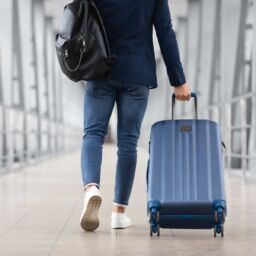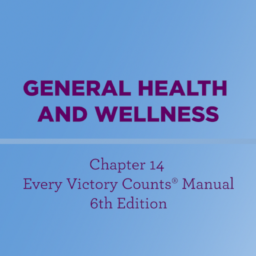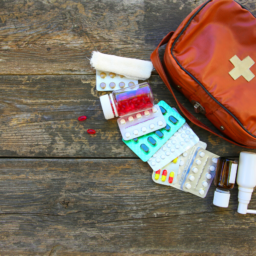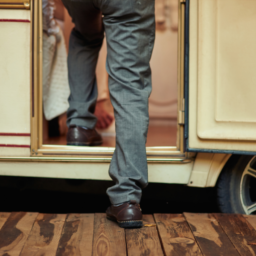The holidays are one of the busiest travel seasons of the year. Whether you are traveling by airplane, car or some other method, there are ways to make the process of traveling smoother so you can save your energy for enjoying your friends and family.
Keep Medications Handy
It's important to keep your medications with you at all times. Keep them someplace accessible throughout your journey. Do not pack medications in a suitcase that will be checked baggage. If you keep your medications in a pill organizer or reminder system, bring the original prescription bottles as well. While security typically is not interested in prescription medications, you’ll want to be sure you have the original bottle with your name, your doctor’s name and specifics about the medication in case they do ask.
It can also be helpful to travel with some over-the-counter medications that you might need on the road, such as antacids. If you plan to travel with other over-the-counter medications, consider purchasing individually-wrapped items that you can separate and take what you need. Again, security services at various airports and other locations typically don’t monitor medications very closely, but having the original packaging can help in case you are asked any questions.
Tip!
When traveling with liquefied medications (such as the gel form of carbidopa/levodopa for the Duopa pump that was recently approved in the US), you will need a letter from your doctor. Although you are permitted to travel with medications greater than the 3 ounce limit specified by the Transportation Safety Administration, those medications will be subject to additional scrutiny and you’ll need the documentation from your doctor as part of that process. Again, keep these medications with you in your carry on and do not put them in your checked luggage.
Summarize Important Information and Keep It
It is a good idea to keep a list of all of your medications with their respective timing and doses with you as you travel. If you have any kind of emergency, it can provide critical information. If for some reason you need to replace medications on the road, this list can be used as a resource for a pharmacist.
It’s also a good idea to keep an emergency contact list with information about your neurologist, primary care physician and other healthcare providers as well as the names and contact information of family members or other people that should be contacted in case of emergency.
The Davis Phinney Foundation has worksheets available on our website that you can download and print out for travel. Whether you need a Medication Log or a Doctor Contact Information list we have the forms you need.
You may consider downloading the Prepare for Your Hospital Stay Worksheet that provides basic information about Parkinson’s as well as a list of commonly used medications that should be avoided by people with Parkinson’s in case of emergency hospitalization.
Bring a Water Bottle and Stay Hydrated
Remaining hydrated is an important aspect of staying healthy while you travel. Medications work more efficiently when you’re properly hydrated and proper hydration may also help you avoid lightheadedness and dizziness. When you’re on the road, details like drinking enough water tend to get missed during all the activity and commotion.
Using a water bottle regularly can help you keep on top of staying hydrated. Reusable water bottles save money and have a much more secure and reliable lid to avoid spills and other challenges. Most airports in the United States have “bottle filling” stations located by the drinking fountains, although you can always fill your water bottle up at any drinking fountain. Many restaurants can also fill a water bottle if you ask them.
If you are traveling somewhere that requires you to go through security before entering the boarding area, just remember to keep your bottle empty until you go through security and fill it up afterwards.
Take Advantage of the Help Offered
If you’re traveling by airplane, don’t hesitate to ask for special accommodations. All airlines offer “preboarding” for people who need additional time getting situated on the airplane. If this makes things go smoother for a little extra peace of mind, you should consider taking advantage of that option.
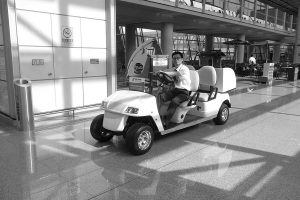 You can also ask for transportation assistance to and from the gate. Often, this includes a ride in a motorized vehicle. If you prefer, the airline can also provide you with a wheelchair (as well as someone to push it). Taking advantage of this type of help can help conserve energy so you are more well-rested when you meet up with your loved ones for the holidays. It can be helpful to call ahead to access these services. You can also visit the desk associated with your airline when you’re checking in at the airport.
You can also ask for transportation assistance to and from the gate. Often, this includes a ride in a motorized vehicle. If you prefer, the airline can also provide you with a wheelchair (as well as someone to push it). Taking advantage of this type of help can help conserve energy so you are more well-rested when you meet up with your loved ones for the holidays. It can be helpful to call ahead to access these services. You can also visit the desk associated with your airline when you’re checking in at the airport.
Another little-known option for people with Parkinson’s is the ability to bring a “non-traveling companion” with you to see you off at the gate if assistance is needed getting to the airplane. The airline will have to issue your traveling companion a pass that will allow them to go through TSA with you at the same time that they issue your airline ticket. Since not all airlines offer this option, call to ask before you purchase your airline ticket if you wish to take advantage of this.
More Quick Tips and Tricks for Traveling with Parkinson’s:
- Time Your Travel When You Feel Best. Travel at times when your medications provide their best benefit to you. For example, if you are someone who feels best in the morning, consider flying or traveling at that time.
- Having Trouble Getting In and Out of Car or Airplane Seats? Keep a disposable plastic grocery bag with you so you can open it up and sit on it when you want to get out of your chair. The plastic will reduce friction when rotating in your seat, making it much easier to turn so you can get out of your chair
- Bring a Sleep Mask and Earplugs. Many people with Parkinson’s have difficulty sleeping. Keeping a sleep mask and a pair of soft foam earplugs nearby can help you get some rest when you’re traveling. You might also consider adding an inflatable neck pillow for additional comfort.
- Stash Clear Zipper Bags in Your Luggage. There are many times when having a nice waterproof bag can be handy while traveling. Both the quart and gallon-sized zip-top bags are helpful. You can also use baggies to store key items that you’re going to need for the flight, such as earbuds, a book or e-reader, a snack and maybe even some medications. You can place this bag into the seatback pocket in front of you, making it easier to store the rest of your items under your seat or in the overhead bin.
- Keep a Small Towel Handy. If you happen to have a spill while you’re traveling, having a small absorbent towel handy can be a lifesaver. Instead of hunting around for napkins or towels (or waiting for a flight attendant to bring you something), you can just clean things up on the fly. As an added bonus, you can use it as a napkin at mealtimes to provide some protection for your clothing.
- Snap a Photo of Your Parking Spot. If you’re going to be out of town for a while, take a quick picture of where you parked or make a note in your phone in case you forget exactly where you left your car when you return.
And Remember, You Have Rights!
Airline Passengers with Disabilities Bill of Rights - In July 2022, the US Department of Transportation announced the official adoption of a new set of disability policy priorities, including a bill of rights for airline passengers with disabilities. The Airline Passengers with Disabilities Bill of Rights summarizes the fundamental rights of disabled passengers on flights in accordance with the Air Carrier Access Act. This document outlines disabled passengers’ rights to be treated with respect, to accessible airport and airplane facilities, and to assistance at airports and on aircraft.
Check out the following links for more travel Tips:
7 Tips to Navigating America’s Busiest Airports (AARP)
5 Common Air Travel Mistakes (AARP)









